The store of the future is already open
In retail trade the automation of payment processes has become unavoidable by now.
This article is available for reading in Trade magazin 2025/8-9.
Self-checkouts, Scan&Shop terminals and smart payment alternatives haven’t only become widespread in grocery stores, but also appeared in new segments such as fashion stores, fast food restaurants, bookstores and entertainment venues. By focusing on the customer experience, retailers are doing their best to provide personalised, fast and seamless payment options.
Modular innovation
Diebold Nixdorf Kft.’s flagship product, the Easy One self-checkout, has been given the Red Dot Design Award. Its modular design makes it suitable for any store and the solution can be combined with a wide range of peripherals. The company’s Vynamic® Smart Vision platform integrates with existing camera networks and uses AI to deter theft.

Tamás Varsányi
key account manager
Diebold Nixdorf
“One of its main advantages is its age estimation algorithm, which reduces the need for personal intervention when selling age-restricted products. Fresh produce and products without barcodes can be identified quickly and accurately, and multiple items can be recognised at the same time, by this speeding up the checkout process”,
says key account manager Tamás Varsányi.
Proper training for employees is essential for the introduction of new innovations.
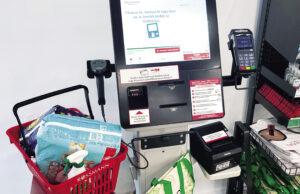
The ability to switch flexibly between traditional and self-service checkout systems is increasingly becoming a standard customer expectation
Easy use, stable operation
With its Android-based POS terminals and SoftPOS solutions, myPOS is among the leaders in the industry. They pay special attention to the integration of their systems and the continuous development of payment technologies.

Ferenc B. Tóth
country manager for CEE
myPOS
“Our customers receive comprehensive support, but the need for intervention is minimal as our devices are reliable. The user interface is logical, so few questions arise during use. If they do, we resolve them quickly and efficiently”,
tells Ferenc B. Tóth, country manager for Central and Eastern Europe.

Attila Bessenyei
CEO
Laurel
New solutions from Laurel Kft. include the cash register mix and the dual cash register. The former allows cashiers to also monitor self-checkout, while the latter is a special hybrid cash register that can be switched between self-service and cashier mode at the touch of a button.
“Our hybrid store solution makes it possible for larger shops to operate without staff outside opening hours. These automated systems aren’t designed for container-type stores, but for the conversion of classic retail units”,
explains CEO Attila Bessenyei.
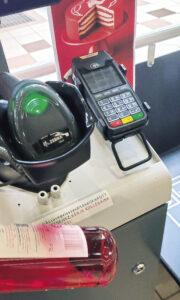
The new generation of electronic cash registers integrates seamlessly with payment solutions and digital services
Security and sustainability
The conquest of automation has also unveiled new challenges. Accidental errors and intentional abuse are becoming more common, which can result in significant inventory discrepancies and business losses. AI plays a key role in preventing and managing such situations. Sustainability remains a priority and retailers prefer models that aren’t only economical to operate, but also energy-efficient, durable and easy to repair.
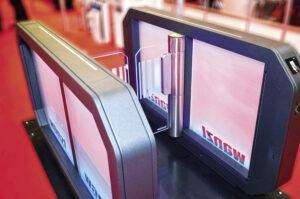
Where open and freely accessible store environments were the norm over the past decade, the emphasis is now shifting back toward controlled exit points
Szintézis Zrt. wishes to make the benefits of automation available not only to larger chains but also to smaller stores, e.g. their latest self- checkout system serves this purpose.

Dávid Szabó
CEO
Szintézis
CEO Dávid Szabó:
“We will soon be launching a new, unmanned store concept, which is already attracting a lot of interest. It is based on a cloud-based, platform-independent checkout system called Celeste, which works seamlessly even without an internet connection.”
Upgradable and expandable
As a key player on the domestic cash register market, CMO24 Hungary Kft. is already preparing for the introduction of e-cash registers. The cash register systems of the future will combine electronic payment, data reporting and fiscal requirements in a single unit.

Gábor Várkonyi
CEO
CMO24 Hungary
“Our solutions are ready to support qvik payments, electronic receipt management and new features such as VAT discounts for pensioners. When developing new-generation systems, it is very important that they can be easily updated and expanded as required”,
stresses CEO Gábor Várkonyi.
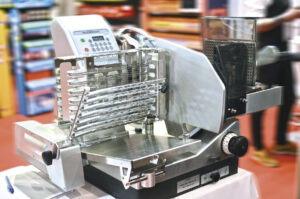
A key consideration in the development of next-generation systems is that they should be easily upgradable and scalable according to demand.
On a global scale, the weighing market is driven by digitalisation and automation. The integration of scales into other systems such as data management and recording software is becoming a priority. State-of-the-art weighing technologies are already available in Hungary, but there is still room for improvement in automation and network integration.
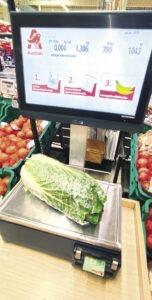
Standalone product recognition systems and high-speed labeling equipment for variable-weight items are becoming increasingly widespread
Design and functionality
Bizerba Mérleg Hungária Kft.’s products are characterised by German precision and sophistication. The key to their success is top-level, customer-oriented service.

László Hegyi
retail business unit manager
Bizerba Mérleg Hungária
“Our partners can choose from a variety of contract schemes, allowing us to tailor our services to their specific needs. The Bizerba team offers remote support, training, regular maintenance and ad hoc repairs”,
we learn from retail business unit manager László Hegyi.
New-design scales and labellers will come out in the second half of the year. Automated systems are playing an increasingly important role in the food and retail sectors. Some labellers can label hundreds of packages per minute while also recording accurate data, including weight, price, and barcodes. Integrated labelling scales have long been used in supermarkets and AI-powered automatic product recognition options are expected to appear in self-service scales as well.
Self-learning smart scales
Laurel’s latest generation of touchscreen scales has been developed with modern retail requirements in mind. The display of the LR Scale 100 series is easy to read for all age groups and users can quickly find their way around, thanks to the icons. The built-in label printer is extremely fast and changing the paper roll takes just a few simple steps. The water- and dust-proof design is practical when weighing fruit and during regular cleaning.

Zoltán Novák
general manager
Micra-Metripond
Micra-Metripond Kft.’s portfolio includes innovative products such as the Dibal LS-5000, which can label up to 200 items per minute, print multiple barcodes and complies with the EU’s 1169/2011 food information regulation. The self-service models of the Dibal CS-2255 PC-based scale range are well suited to supermarket operations, as they contribute to fast, automated product recognition and price labelling.
“After installation immediate servicing and remote diagnostics are essential for smooth operation. We place great emphasis on training – it is a priority for both the shop owner and us”,
says general manager Zoltán Novák.
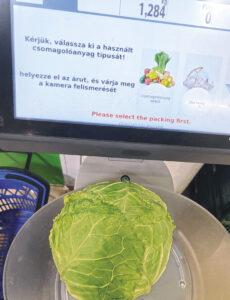
Automatic product recognition options not only enhance the customer experience, but also help reduce losses resulting from accidental or deliberate weighing errors by buyers
Retail trade entering a new era
On 28 May Laurel Számítástechnikai Kft. held its 12th Retail Conference in Budapest.
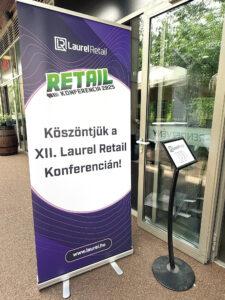
At the Laurel conference, several tools representing the next level of digitalization were showcased
In his welcome speech CEO Attila Bessenyei told: we are entering a new era in the world of retail. He also called attention to various tools that can be considered the next step in digitalisation.
Richárd Szabados, state secretary for SME development and technology at the Ministry for National Economy reviewed the government’s support programmes.
Dr Tamás Kozák, secretary general of the National Trade Association pointed out that the profitability of retail trade has been declining in Hungary for years, mainly owing to trade policy decisions. Meanwhile the productivity and efficiency of those working in the sector has surpassed the national average, thanks to the innovations mentioned by Attila Bessenyei in his introduction.
When technological progress and shopper needs meet

Mirjam Kertész
owner
Coninvest
Machines that serve the on-site processing, preparation or even production of ready-made meals are playing an increasingly important role in grocery stores and supermarkets, stresses Mirjam Kertész, the owner of Coninvest Kft.
Meat grinders, vegetable slicers, kneading machines, moulders, vacuum film wrappers and ice machines no longer just support background processes, but are also key to freshness, quality and fast service. Today these machines are energy-efficient, quiet, have smart features and easy to clean. Coninvest has been a supplier of Spar Magyarország stores for many years, which uses Meiko under-counter dishwashers to disinfect various transport containers and crates. Coninvest offers partners not only machines, but also a wide range of services: consulting, commissioning, training, regular maintenance and quick repair service.
Related news
Related news
Spring whirlwind at the 60th anniversary EuroShop trade fair
🎧 Hallgasd a cikket: Lejátszás Szünet Folytatás Leállítás Nyelv: Auto…
Read more >The GKI business climate index rose in February
🎧 Hallgasd a cikket: Lejátszás Szünet Folytatás Leállítás Nyelv: Auto…
Read more >








